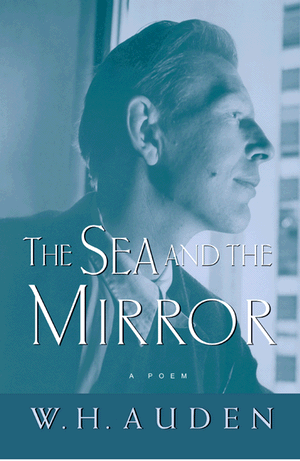Caliban the Sea and the Mirror Read Aloud Auden
This Enchanted Isle: reading W H Auden's 'The Sea and The Mirror'
Shakespeare's The Tempest contains a potent mix of the worldly (politics, power, parenthood) and the other-worldly (myth, magic, monsters). In the mercurial spirit Ariel and the bawdy, 'monstrous' Caliban, elemental forces are given costless rein to express their desires, while Prospero delivers some of the most famous lines in all literature:
These our actors,
As I foretold you, were all spirits and
Are melted into air, into thin air:
And, like the baseless material of this vision,
The cloud-capp'd towers, the gorgeous palaces,
The solemn temples, the swell globe itself,
Ye all which information technology inherit, shall deliquesce
And, similar this insubstantial pageant faded,
Go out non a rack behind. We are such stuff
Equally dreams are made on, and our picayune life
Is rounded with a slumber.
In the central figure of Prospero, every bit Frances Yates suggested, we may run across "non only the Magus as philosopher and as all-powerful magician ushering in the scientific age almost to dawn, only also the Magus as creator of the theatre and its magic" – a effigy in which we can recognize Shakespeare, the magician-artist, himself.
It is non surprising that this play would inspire West.H. Auden's poem sequence 'The Sea and the Mirror', composed between 1942 and 1944: his interest in Freud (himself a bully reader of Shakespeare) would allow for a psychoanalytic interpretation of the magical figures; the political machinations and ability struggles between the exiled ex-duke Prospero and his usurping brother Antonio (non to mention Prospero vs the witch Sycorax, Prospero vs Caliban, Prospero vs everyone who disturbs his peace) would be an attractive field of study for a poet whose piece of work of the 1930s was defined by the rise of Fascism in Europe.

Ariel
In 'The Body of water and the Mirror', Auden gives the characters of the play new dramatic voices, new monologues, and in a wide multifariousness of traditional forms: Antonio talks in terza rima, Miranda is given a villanelle, her suitor Ferdinand has a sonnet, the sailors sing a lively ballad, Sebastian works through his thoughts in a sestina, and Caliban – the unruly native who was taught English and learned how to curse with information technology – lets loose with fifteen pages of dense, rhetorical prose. Added to the mix are fine, delicate lyrics and prophetic declamations. It is a tour de force of ideas and invention.
In my online reading group nosotros will first look at the poem'south context in relation to the play itself, so in that location will exist opportunities to deepen or refresh your knowledge of Shakespeare's text and to consider it from a different angle. A close reading of the poems themselves will reveal their contemporary significance – for Auden'south war-torn 1940s besides as our own times. Given the importance of traditional forms in this sequence, there volition exist optional creative writing exercises in which you can try your hand at these. The stage is ready, the revels are simply first:
O what authorization gives
Existence its surprise?
Science is happy to answer
That the ghosts who haunt our lives
Are handy with mirrors and wire,
That song and carbohydrate and burn down,
Courage and come up-hither eyes
Take a genius for taking pains.
But how does 1 think up a habit?
Our wonder, our terror remains.
Auden'due south circle at Oxford Academy in the tardily 1920s included Stephen Spender, Cecil Solar day-Lewis (father of the thespian Daniel Mean solar day-Lewis), and Louis MacNeice. Forth with Christopher Isherwood they would define the politically engaged poetry of the era. Auden would go on to produce some of the most memorable lines in English language verse – the opening lines of 'Musée des Beaux Arts', for example:
About suffering they were never wrong,
The One-time Masters: how well they understood
Its human being position; how it takes place
While someone else is eating or opening a window or simply
walking dully forth …
His work has found a new pop audience through its advent in pic, most notably his 'Funeral Dejection':
Stop all the clocks, cut off the telephone,
Prevent the dog from barking with a juicy os,
Silence the pianos and with muffled drum
Bring out the coffin, let the mourners come.
At the fourth dimension of writing 'The Sea and the Mirror', Auden was a full-time resident in America and education at the Swarthmore College in Pennsylvania; he had received the typhoon phone call to bring together the Usa Regular army in 1942 but was rejected on medical grounds. Information technology was against the backdrop of the Second Globe War, while adjusting to a new life on new shores, far from the devastations of bombed-out England, that Auden turned to The Storm for consolation and instruction. Could strife be resolved? Could the world be renewed? Was natural social club a fantasy? Could people love one another? Significant questions demanded pregnant poems, and this was Auden'south task in writing 'The Sea and the Mirror'.

Detect the mysterious world of Auden'southward 'commentary' on The Tempest on This Enchanted Isle: reading Auden's 'The Sea And The Mirror' with A B Jackson. This online reading group is an absolute steal at £15! Volume your place now or ring us on 0207 582 1679.
What students have said well-nigh our online reading groups:
"This was a vivid course … I would definitely do another"
"The information and attention to item in the Mercian Hymns form was excellent"
"This was incredible value for money … [our tutor] gave above and beyond"
"Bookish and rigorous … it gives me admission to ideas, manufactures and tutoring that I tin can't go anywhere else"
Caliban the Sea and the Mirror Read Aloud Auden
Source: https://poetryschool.com/new-courses/enchanted-isle-reading-audens-sea-mirror/
Post a Comment for "Caliban the Sea and the Mirror Read Aloud Auden"